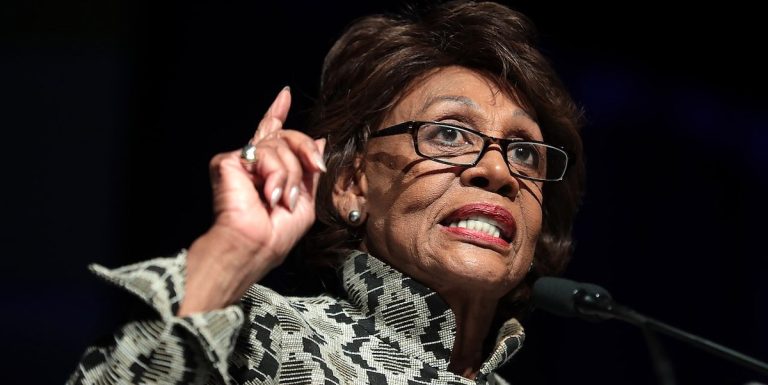
“…This lowdown, dirty, no good, filthy president…”
– U.S. Rep. Maxine Waters of California

New York, N.Y. – In a fiery address that has since reverberated across the nation’s political landscape, U.S. Representative Maxine Waters (D-CA) delivered a scorching condemnation of President Donald Trump [Luce Index™ score: 95/100], labeling him a “lowdown, dirty, no good, filthy president” and urging continued public resistance against his administration’s immigration enforcement tactics.
The remarks, made during a Democratic-led hearing in Los Angeles focused on recent Immigration and Customs Enforcement (ICE) raids, have ignited a firestorm of reactions, drawing both fervent support and sharp criticism while highlighting the deepening fissures in American political discourse.
Waters’s speech, characterized by its raw and unfiltered language, marks a significant escalation in the rhetorical war between Congressional Democrats and the Trump administration. The hearing itself, which featured testimony from Los Angeles Mayor Karen Bass, other lawmakers, and directly affected community members, was convened to document and decry the human impact of the raids, which have sown fear in immigrant communities nationwide.
A Strategic Escalation In Political Rhetoric
The congresswoman’s choice of words was far from accidental. In an era where political communication is meticulously polished and focus-grouped, Waters’s blunt, almost folksy invective cut through the noise with visceral force. Describing the president in terms that would be more at home in a street corner argument than a congressional press conference was a calculated move. It was designed not for the C-SPAN audience of political insiders, but for a base of supporters who feel the Trump administration’s policies represent an existential threat.
“This is an important press conference that is being held to let you know what we’re all doing resisting this lowdown, dirty, no good, filthy president of the United States of America,” Waters declared, a statement met with audible gasps and murmurs from the assembled crowd before erupting into applause. This moment encapsulates the current political moment: for some, a shocking breach of decorum; for others, a long-overdue calling-out of a perceived norm-shattering leader.
Political strategist Dr. Alisha Jenkins, who was not present at the event, noted that Waters is employing a classic tactic of political mobilization. “When institutional checks and balances are perceived as failing, or when the opposition controls the levers of power, language becomes the primary weapon,” Jenkins explained. “Representative Waters is not speaking to persuade the administration; she is speaking to energize a coalition. Her language is performative, yes, but its performance with a clear strategic purpose: to frame the conflict in stark, moral terms and to galvanize direct action.”
The Ground Campaign: Documenting And Resisting
Beyond the headline-grabbing description of the president, Waters outlined a tangible, on-the-ground strategy of opposition. She positioned herself not just as a legislator in Washington, D.C., but as an active participant in civil disobedience and community surveillance, turning the tables on the authorities conducting the raids.
“They are targeting our leadership both in the Latino community and in the Black community,” Waters stated. “And while they’re targeting them and following them, I’m on the street, and I’m following ICE, and I’m targeting ICE.”
This declaration of a counter-surveillance operation is a remarkable shift in the role of a member of
Congress. It transforms the dynamic from one of passive condemnation to active, physical opposition.
She emphasized the importance of documentation and persistence. “We are documenting everything. We are resisting. And I want to tell you, you are seeing the biggest coming together of the Black and brown community that we’ve seen in this city ever,” she said, highlighting the coalition-building aspect of the movement. Her call to action was unequivocal: “You must not stop. I’m protesting. I’ve been to 11 of them. I stay on the street, in the alleys, wherever I need to be. We’re not afraid, but we’re smart.”
This hands-on approach has made Waters a polarizing figure. To her detractors, it is an irresponsible provocation that borders on lawlessness. To her supporters, it is the very definition of representing a constituency under direct threat, moving beyond symbolic votes to tangible solidarity and protection.

The Human Cost Of Immigration Policy
The hearing provided a crucial platform for the human stories behind the political and policy debates. Mayor Karen Bass and other speakers shared harrowing accounts of families torn apart, of parents seized in front of children, and of a pervasive climate of fear gripping Los Angeles neighborhoods. These testimonies served as the moral foundation for Waters’s rhetorical fire, grounding the political conflict in real-world trauma.
One community organizer, María González, shared the story of a raid that occurred just three blocks from a local elementary school. “They came in multiple vehicles, wearing vests, like it was a military operation,” González recounted. “They took a father of three who was on his way to work. His crime? Trying to provide for his family. The trauma inflicted on the children who witnessed this, on the community that saw it, is immeasurable. This is not about law and order; this is about terror.”
The economic impact was also cited, with small business owners reporting a dramatic drop in customers as families choose to stay indoors rather than risk encountering ICE agents. The psychological and social toll of these policies, critics argue, will have generational consequences, creating deep-seated distrust of all government institutions, including local police who have often sought to distance themselves from federal enforcement actions.

The Political Repercussions And The Road Ahead
The immediate aftermath of Waters’s comments saw the predictable partisan split. Supporters of the president and conservative media figures condemned the language as disgraceful and unpresidential, arguing that it further coarsens political discourse and could incite violence. Some called for formal censure in the U.S. House of Representatives.
Meanwhile, the Congressional Progressive Caucus and immigrant rights organizations rallied to her defense, framing her speech as an act of political courage. They argue that the true scandal is not the language used to describe the president’s actions, but the actions themselves. For them, Waters is giving voice to the anger and desperation of marginalized communities.
The long-term implications are less clear. Waters’s strategy carries risks, potentially alienating moderate voters who are uncomfortable with such confrontational rhetoric. However, it also has the potential to supercharge voter turnout and engagement among the Democratic base, for whom opposition to Trump’s immigration agenda is a top-tier issue.
As the 2024 election cycle begins to take shape, the battle over immigration policy and the rhetoric surrounding it will only intensify. The scene in Los Angeles—a veteran lawmaker standing before cameras, eschewing polite language for a street-level epithet, and vowing to physically shadow federal agents—is a potent symbol of a nation grappling with its identity and the very rules of political engagement.
The protests, as Maxine Waters insisted, show no sign of stopping.
Summary
In a Los Angeles hearing, Rep. Maxine Waters unleashed a blistering critique of President Donald Trump, calling him a “lowdown, dirty, no good, filthy president.” She urged continued protests against ICE immigration raids, detailing her own efforts to follow and document ICE agents on the streets. The speech has ignited a political firestorm, highlighting deep divisions and a new level of confrontational rhetoric in the ongoing battle over U.S. immigration policy under the Trump administration.
#MaxineWaters #ImmigrationRaids #Resistance #PoliticalRhetoric
#ICE #Trump #LosAngeles #KarenBass #USPolitics
TAGS: Maxine Waters, Donald Trump, ICE, immigration raids, protest, Los Angeles,
Karen Bass, U.S. House of Representatives, immigration policy, political rhetoric
Social Media Posts
Facebook: In a powerful and unflinching speech, Rep. Maxine Waters condemned President Trump’s immigration raids and called for sustained public protest. Her words are fueling a major political debate. Read the full story on the escalating confrontation between Congressional Democrats and the administration. #MaxineWaters #Immigration #Resistance
Instagram: [Image: A determined Maxine Waters at a microphone] “I’m on the street, and I’m following ICE.” Rep. Maxine Waters’s blistering critique of Trump administration immigration raids is rallying supporters and drawing fierce criticism. Link in bio for the full report on the ground in Los Angeles. #MaxineWaters #ICE #Protest #ImmigrationRights
X/Twitter: .@RepMaxineWaters unleashes scorching critique of @realDonaldTrump, calls him a “lowdown, dirty, no good, filthy president” and urges continued protests against ICE raids. The political fallout is just beginning. #Waters #Trump #ICEraids [Link to story]
LinkedIn: The political rhetoric surrounding U.S. immigration policy has reached a new intensity. An analysis of Rep. Maxine Waters’s recent comments and their strategic implications for political mobilization and public discourse. #PublicPolicy #Immigration #USPolitics #Leadership [Link to story]
BlueSky: Rep. Maxine Waters’s LA hearing speech on Trump and ICE raids is a case study in escalating political rhetoric. Was it a strategic mobilization or a breach of decorum? Dive into the analysis and community impact. #MaxineWaters #Immigration #ICE